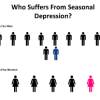- Empty cart.
- Continue Shopping
How to Manage Seasonal Allergies in Men

Seasonal allergies, often referred to as hay fever or allergic rhinitis, can affect individuals of all genders, including men. These allergies typically occur when your immune system reacts to pollen from trees, grasses, and weeds, leading to symptoms like sneezing, congestion, and itchy eyes. Managing seasonal allergies is essential to maintaining your quality of life and overall well-being.
1. Identify Allergen Triggers
Understanding your specific allergy triggers is the first step in managing seasonal allergies. Allergists can conduct tests to determine which allergens affect you the most. Common outdoor allergens include tree pollen in the spring, grass pollen in late spring and early summer, and weed pollen in the fall. Knowing your triggers helps you prepare and take preventive measures.
2. Monitor Pollen Counts
Keep an eye on pollen counts in your area. Many weather websites and apps provide daily pollen forecasts, allowing you to plan your outdoor activities accordingly. On days when pollen counts are high, consider spending more time indoors and taking extra precautions.
3. Use Air Purifiers
Invest in a high-quality air purifier for your home, particularly in your bedroom. Air purifiers help remove allergens, including pollen and dust mites, from the air, providing relief while you sleep.
4. Keep Windows Closed
During peak pollen seasons, keep windows and doors closed to prevent allergens from entering your home. Use air conditioning with a clean filter to circulate filtered air.
5. Regular Cleaning
Regularly clean your home to reduce allergen exposure. Vacuum carpets, rugs, and upholstery using a vacuum cleaner equipped with a HEPA filter. Dust surfaces with a damp cloth, and wash bedding and curtains frequently.
6. Nasal Irrigation
Nasal irrigation with saline solution can help relieve congestion and remove irritants from your nasal passages. Consider using a neti pot or a saline nasal spray to irrigate your nasal passages.
7. Over-the-Counter Medications
Over-the-counter (OTC) antihistamines and decongestants can provide relief from seasonal allergy symptoms. Antihistamines block histamine, a chemical responsible for allergy symptoms, while decongestants can reduce nasal congestion. Consult a healthcare provider or pharmacist for guidance on choosing the right OTC medication for your symptoms.
8. Prescription Medications
If OTC medications are ineffective, consult an allergist or immunologist for prescription medications. These may include stronger antihistamines, nasal corticosteroids, or allergy shots (immunotherapy) for long-term relief.
9. Allergy Shots (Immunotherapy)
Allergy shots are a long-term treatment option for individuals with severe allergies that don’t respond well to other treatments. These shots gradually expose your body to allergens, helping it build tolerance over time.
10. Avoid Outdoor Activities During High-Pollen Times
When pollen counts are high, especially in the morning and on windy days, try to limit outdoor activities. If you must be outdoors, wear sunglasses to protect your eyes and a hat to prevent pollen from settling in your hair.
11. Allergy-Friendly Landscaping
Consider landscaping your yard with plants that produce less pollen, such as female trees (which don’t produce pollen), or low-pollen plants and flowers. Consult a landscaper or local nursery for guidance.
12. Eye Protection
If you experience itchy, watery eyes due to allergies, wearing wraparound sunglasses or protective eyewear can help reduce your exposure to airborne allergens.
13. Stay Hydrated
Drinking plenty of water can help thin mucus and soothe irritated nasal passages, reducing congestion and discomfort.
14. Reduce Stress
Stress can exacerbate allergy symptoms. Practice stress-reduction techniques such as deep breathing, meditation, or yoga to help manage your symptoms.
15. Consult a Healthcare Provider
If your seasonal allergies are severe or significantly impact your quality of life, consult a healthcare provider or allergist. They can help develop a personalized treatment plan and discuss options like prescription medications or immunotherapy.
In Conclusion, Seasonal allergies can be bothersome, but with the right strategies, men can effectively manage their symptoms and enjoy life even during high-pollen seasons. By identifying triggers, using preventive measures, and considering medication options, you can minimize the impact of seasonal allergies and lead a more comfortable and symptom-free life. If allergies persist or worsen, seek professional guidance to explore additional treatment options tailored to your specific needs.








